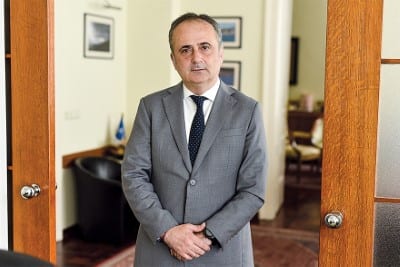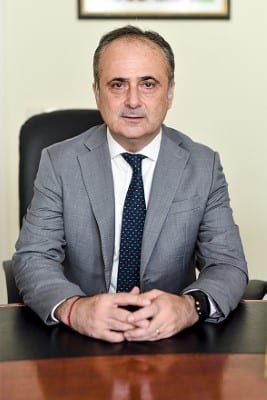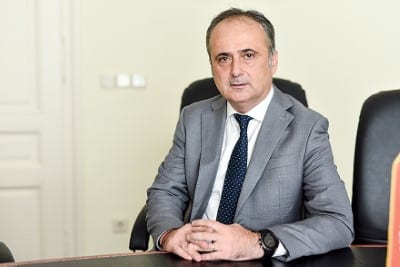What it is crucial is to ensure is the realisation of all rights guaranteed by the existing national and international legal framework for the protection of minorities. Relations with the countries of Southeast Europe and EU enlargement will among the main priorities of Croatia’s presidency of the EU in the first half of 2020, says Ambassador Gordan Bakota
Commenting in this CorD interview on the message of Croatian officials that Serbia’s route to the European Union leads via Croatia and that it will not be lenient in insisting on the resolving all bilateral issues, Ambassador Bakota suggests that this be understood as an incentive for Serbia to meet the criteria that have been met by other countries prior to joining the Union.
Your Excellency, a year has passed since your arrival in Serbia. How would you rate this period, during which one presidential visit – that of Aleksandra Vučić to Croatia – was also realised?
The past year was dynamic, and there were ups and downs in bilateral relations. As you mentioned in the question, President Vučić’s visit to Croatia in February should certainly be singled out. The meetings of President Kolinda Grabar Kitarović and President Aleksandar Vučić, as well as those with Prime Minister Andrej Plenković, were important because they showed the desire of both parties to improve relations, and especially to accelerate work on resolving the open issues that burden our relations. A series of meetings were held after both, both at ministerial and expert levels, through the work of mixed committees for addressing open issues.
I would like to point out in particular that a need was recognised to intensify cooperation in resolving the fate of missing persons and that the issue of minority status was an important topic. I’m glad to be able to note that there have been positive developments in a number of areas since the visit. Just one example: education ministers agreed to open a Croatian grammar lectorate at the University of Novi Sad, which is of great importance to the Croatian minority in Serbia.
 Economic cooperation is advancing well. Due to a large number of our companies that operate in Serbia, but also those wanting to establish contacts or open businesses in Serbia, the Representative Officer of the Croatian Chamber of Commerce in Belgrade has been opened.
Economic cooperation is advancing well. Due to a large number of our companies that operate in Serbia, but also those wanting to establish contacts or open businesses in Serbia, the Representative Officer of the Croatian Chamber of Commerce in Belgrade has been opened.
We also have a very high quality and dynamic exchange/cooperation in the field of culture, especially in terms of excellent theatrical performances, exhibitions and concerts.
I think we can confirm that, compared to previous years, the dialogue has been intensified and progress realised. But, we can certainly do better and more in our relations. And that requires constant investments of efforts in creating a positive atmosphere in which it is possible to work on improving relations. Unfortunately, over the course of this year, there was a series of events and incidents that don’t contribute to this but rather, on the contrary, impact negatively on our relations. However, Croatia remains committed to strengthening good neighbourly cooperation and developing relations, and I will personally continue to exert maximum efforts to this end.
When Croatian Prime Minister Plenković says that Serbia’s route to the EU leads via Croatia, should that be considered a threat or an incentive?
As an incentive, of course. And I’ll just cite a few facts that show why I think so:
Croatia strongly supports the European Union enlargement process for all countries in SEE, including Serbia’s accession negotiations. It is in our strategic national interest to have a neighbourhood that shares the same European values and standards. I think that in the Council of the EU there are few countries that so systematically and honestly advocate for cooperation with the SEE countries and enlargement as Croatia does.
As such, relations with SEE countries and EU enlargement will be among the main priorities of the Croatian EU Presidency in the first half of 2020. Then, based on our initiative and as a follow-up to the Sofia summit, a new meeting will be held between leaders of the EU and the Western Balkans in Zagreb. The Zagreb Summit will be held 20 years after the summit of leaders held in Zagreb that opened the prospect of European integration to Croatia and other SEE countries. This provides a powerful message that we want to offer a hand to our neighbours and help them on their journey.
Croatia strongly supports the European Union enlargement process for all countries in SEE, including Serbia’s accession negotiations. It is in our strategic national interest to have a neighbourhood that shares the same European values and standards
Croatia underwent that long and demanding journey to EU membership and we consider that our experience of that process can be of great help, so we will continue providing direct political and expert support.
All countries wanting to become members must be aware that the route to membership is conducted only through the fulfilling of criteria. Those criteria – both political and technical – are well-known. That’s why our main message to Serbia and other SEE countries is that it is crucial to fulfil the criteria and prepare for new steps. And we are also ready to help them in that.
Respect for the status and rights of minorities is one of the topics of bilateral relations that is insisted on in particular. How would you comment on individual incidents regarding national minorities?
As you have yourself stated, issues related to minority rights – both of Croats in Serbia and Serbs in Croatia – are a very important segment of our bilateral relations.
I would firstly like to point out the conviction that the Serbian minority in Croatia and the Croatian minority in Serbia can and must play a major and positive role in building overall bilateral relations. What it is crucial is to ensure is the realisation of all rights guaranteed by the existing national and international legal framework for the protection of minorities.
 Croatia and Serbia have a concluded minority protection agreement that has formed the basis for the creation of an Intergovernmental Committee on Minorities, which represents a forum for discussion on all issues related to the implementation of minority rights.
Croatia and Serbia have a concluded minority protection agreement that has formed the basis for the creation of an Intergovernmental Committee on Minorities, which represents a forum for discussion on all issues related to the implementation of minority rights.
I would remind that the constitutional legal framework in Croatia guarantees great rights for all national minorities. Thus, political representatives of the Serbian national minority in Croatia have a Constitutionally guaranteed number of MPs in the Croatian Parliament. Moreover, they form part of the parliamentary majority, support the work of the Croatian Government and participate actively not only on resolving minority issues but also on issues of concern to all citizens. In this way, the high level of protection of the rights of national minorities is further affirmed and incorporated into the wider political culture. Simultaneously, Croatia strongly condemns all individual and isolated incidents that impact on members of national minorities in Croatia.
On the other hand, we welcome the communication established between Serbia’s highest representatives and representatives of the Croatian minority in Serbia. We believe that through direct communication the Croatian community will achieve the full implementation of its rights as envisaged by the bilateral agreement, Serbian laws, international conventions and what is expected of Serbia within the scope of the EU accession process.
Are you satisfied with preparations for elections for the national council of the Croatian national minority?
The fact is that preparations for national minority council elections are taking place only a few months after the adoption of the new National Council Act. National minorities have, thus, little time to prepare for activities envisaged by the new Act. As they don’t have conditions for direct elections, members of the Croatian minority will again elect a new council of the Croatian National Council via the electoral assembly.
The process of collecting signatures for Croatian electors has been completed, which was additionally complicated and demanding for the Croatian community, due to new legal provisions and short deadlines. We expect that chosen electors, in a democratic and constructive atmosphere, to decide on the new convocation of the Croatian National Council on election day.
Political representatives of the Serbian national minority in Croatia have a Constitutionally guaranteed number of MPs in the Croatian Parliament. Moreover, they form part of the parliamentary majority, support the work of the Croatian Government and participate actively not only on resolving minority issues, but also on issues of concern to all citizens
How would you assess economic relations between the two countries? Is there any basis to the impression that this cooperation goes far beyond communication at the political level? Economic cooperation between the Republic of Croatia and the Republic of Serbia can, without any doubt, be seen as the leading light of our bilateral relations. This cooperation has in recent years been marked by a positive trend of continuous growth in volumes of trade and high levels of Croatian investments in Serbia, which now amount to more than 750 million euros. I would also positively evaluate the fact that investments in the opposite direction have also been instigated, primarily in the tourism sector. I’m glad that Croatia is visited every year by growing numbers of tourists from Serbia and I’m sure that improved infrastructure connectivity will contribute to this growth being even more significant.
Economic cooperation could certainly be much better if individual problems were solved, such as the incompatibility of certain regulations and procedures, which would ensure the equitable and more efficient flow of goods. Although economic relations have their own development logic, the political atmosphere continues to play a very important role in the development of these relations, as every change in the political domain, whether positive or negative, reflects on economic relations in a certain way.
Could you tell us more about the joint project to modernise the railway from Belgrade to Zagreb, with EU support?
This relates to the railway line that was an integral part of pan-European Corridor 10, which stretched from Salzburg to Thessaloniki. Unfortunately, due to the events of this region in the ‘90s, a new Trans-European transport network was established that didn’t include this route. However, a 2015 agreement between the EU and the Western Balkan 6 saw that network expanded and this line was recognised as the main route of the Trans-European Transport Network (TEN-T) for connecting the EU with Serbia, which also enabled co-financing for the reconstruction of tracks from EU funds.
 Reconstruction of this line is primarily essential for the return of freight traffic from southern and central Europe, which is in the interest of both countries. That’s why a Memorandum of Understanding on its renewal and modernisation was signed in Belgrade on 9th March this year. Croatia has to date invested around 130 million euros in the modernisation of this line and is currently in the process of compiling a project and all other necessary documentation for which the necessary funds have been secured. This busy route is today utilised on a daily basis by an average of three international passenger trains and 10-12 freight trains, while the reconstruction of the remaining sections of this rail route will give it a maximum capacity of 230 passenger carriages and 166 freight cars per day, which creates new possibilities to further improve trade cooperation.
Reconstruction of this line is primarily essential for the return of freight traffic from southern and central Europe, which is in the interest of both countries. That’s why a Memorandum of Understanding on its renewal and modernisation was signed in Belgrade on 9th March this year. Croatia has to date invested around 130 million euros in the modernisation of this line and is currently in the process of compiling a project and all other necessary documentation for which the necessary funds have been secured. This busy route is today utilised on a daily basis by an average of three international passenger trains and 10-12 freight trains, while the reconstruction of the remaining sections of this rail route will give it a maximum capacity of 230 passenger carriages and 166 freight cars per day, which creates new possibilities to further improve trade cooperation.
The Council of Europe recently criticised the Croatian authorities for their relations towards migrants, warning against police aggression and collective expulsion. How would you comment on these statements?
The Interior Ministry of the Republic of Croatia officially responded to the inquiry by Human Rights Commissioner Dunja Mijatović regarding the management of borders and access to international protection in Croatia.
I would firstly like to stress that all reports of non-governmental organisations and other organisations regarding the alleged use of means of force by police officers against migrants have been checked within the scope of possibilities, given that there is insufficient specific data in the reports.
Economic cooperation could certainly be much better if individual problems were solved, such as the incompatibility of certain regulations and procedures, which would ensure the equitable and more efficient flow of goods
It hasn’t been confirmed in any of these cases that police officers used forced means against migrants, while allegations that police officers committed acts of theft against migrants have also proved to be unfounded.
Turning people away, which is prescribed by the Law on Schengen Borders, implies measures to prevent illegal entry attempts via external borders beyond border crossings. It is due to police officers refusing them entry into Croatia or carrying out other prescribed procedures to return them to the countries from which they illegally entered Croatia that migrants accuse Croatian police officers of violence. They do this based on the expectation that such accusations will help them in new attempts to enter Croatia and continue their journey to their intended final destination.
A strategic, comprehensive and integrated response to the issue of illegal migration is vital to Croatia, but also the EU as a whole. Croatia wants to become part of the Schengen area as soon as possible, and key efforts to that end are directed towards protecting the EU’s external borders, towards Serbia, Bosnia-Herzegovina and Montenegro. Croatia didn’t opt to establish physical barriers in dealing with this challenge, but it has significantly strengthened the capacity of the border police, so that now more than 6,500 police officers work to ensure compliance with European and Croatian regulations.
| RELATIONS
Croatia remains committed to strengthening good neighbourly cooperation and developing relations, and I will personally continue to exert maximum efforts to this end |
MINORITIES
Issues related to minority rights – both of Croats in Serbia and Serbs in Croatia – are a very important segment of our bilateral relations |
MIGRATION
A strategic, comprehensive and integrated response to the issue of illegal migration is vital to Croatia, but also the EU as a whole |
|---|